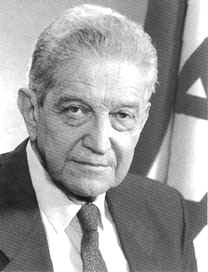Ezer Weizman
(1924 - 2005)
Ezer Weizman - air force general and politician, nephew of Israel's first President Professor Chaim Weizmann, and former President of the State of Israel - was sworn into office on May 13, 1993.
Ezer Weizman was born in Tel Aviv on June 15, 1924, and raised in Haifa. He learned to fly at 16 and began his long military career as a fighter pilot during World War II, joining the Royal Air Force in 1942 at age 18. Returning to Mandatory Palestine after the war, Weizman was one of a handful of pilots who founded the “Air Service” of the Haganah. He served as a fighter pilot during the War of Independence, commanded a squadron, and later (1958-66) was commander of the Israeli Air Force, in which capacity he introduced the use of electronic warfare systems in aircraft. During the Six-Day War he was Chief of Operations of the General Staff, and later Deputy Chief of Staff. He retired in 1969 with the rank of major-general, and turned to politics.
An outspoken individual with strong political views and a vivid personality, Ezer Weizman maintained a high and at times highly-provocative public profile, even while in the army. In the two and a half decades following his retirement from the military, Weizman served in many key political posts. He ran the election campaign that brought Likud leader Menachem Begin to power in 1977, after nearly thirty years in opposition; served as Minister of Defense; and was a member of the Israeli negotiating team to the talks that culminated in the Camp David Accords.
In 1980, Weizman, who had gradually moderated his views, resigned from the government because of disagreements with Begin over the pace of implementing the peace agreements. He briefly retired from politics to pursue a business career. Returning to public life four years later, he formed a small independent party and served as a government minister for the next six years — first as Minister for Arab Affairs, then as Minister of Science and Technology. In 1992 he retired from active politics and a year later, he was elected as the seventh President of the State of Israel.
Almost without actual powers, the Presidency is an institution that relies heavily on style. Ezer Weizman's strong personality and unique manner, which pervaded every task he undertook— from air force commander to government minister — also colored his Presidency. Weizman's down-to-earth manner was quite different from the statesmanlike image and “elevated status” that characterized most of his predecessors. His unique character endowed the Presidency with an informality and lack of reserve that reflects the warm, dynamic and unstructured nature of Israel's society. Thus, the office has in many ways come to mirror the typical Israeli — direct, familial and unceremonious, candid and spontaneous.
While President Weizman conducted state visits to Great Britain, India, South Africa and Turkey, meeting national and Jewish leaders in his travels, he focused more on Israel itself and its citizens — Jews, Arabs and Druze — and on Israel's immediate neighbors.
In addition to planned visits to various communities and participation in major public events, Weizman adopted a schedule that included unplanned and spontaneous visits closely tied to unfolding events, many of them tragic. Thus, during the July 1993 "Accountability" campaign against Hizballah terrorism, the President demonstrated his solidarity with Israeli citizens living on the northern border by visiting them while their towns were still under shell-fire, staying the night with the inhabitants and even sleeping in a bunker with IDF soldiers. President Weizman also visited the wounded in hospitals and the families of the fallen and of terror victims in their homes. Weizman applied the one real power of the Presidency — the right to grant Presidential pardons — in his own way, by refusing to sign some pardons recommended by the Ministry of Justice.
President Ezer Weizman renewed an institution established by one of his predecessors — a monthly gathering of intellectuals and academics entitled the “Bible and Jewish Sources Group,” dedicated to examining and discussing core Jewish issues. This rather exclusive and prestigious circle became a “traveling forum.” Monthly deliberations were conducted in a different outlying location, with former Supreme Court Justice Menachem Elon acting as moderator.
Weizman took a more active role in political developments than did Presidents in the past — first behind-the-scenes, later publicly — and his actions were a source of public controversy. Political figures involved in the peace process met with Weizman, even though this was not part of diplomatic protocol. Moreover, as President, Weizman openly criticized the government's performance and attempted to prevent derailing of the peace process. His unique brand of personal diplomacy, his charm and his personal ties opened communication lines between Israel and the The Palestinian Authority and with Egypt.
Ezer Weizman was re-elected to a second term in May 1998, and resigned from the Presidency in July 2000 when allegations of bribery surfaced related to his time as a lawmaker and cabinet minister. Charges were never pressed because the statute of limitations had expired.
Weizman died April 24, 2005, at his home in Caesarea at the age of 80.
Courtesy of:
http://www.jewishvirtuallibrary.org/jsource/biography/ezer_weizman.html

